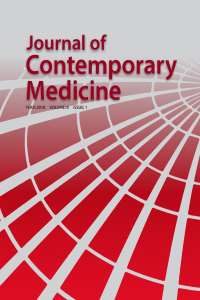Biyolojik Ajan Tedavisi Alan Ağır Astımlı Hastalarda COVID-19 Pandemisi Sırasında Tedaviye Uyumdaki Değişiklikler
Koronavirus Anksiyete Ölçeği, Mepolizumab, Omalizumab, SARS-CoV-2
Changes in Treatment Adherence During the COVID-19 Pandemic in Patients with Severe Asthma Receiving Biologic Agent Treatment
Coronavirus Anxiety Scale, Mepolizumab, Omalizumab, SARS-CoV-2,
___
- Kaplan A, van Boven JF, Ryan D, Tsiligianni I, Bosnic-Anticevich S, Group RAW. GINA 2020: Potential Impacts, Opportunities, and Challenges for Primary Care. J Allergy Clin Immunol Pract 2021;9(4):1516-9.
- Krings JG, McGregor MC, Bacharier LB, Castro M. Biologics for Severe Asthma: Treatment-Specific Effects Are Important in Choosing a Specific Agent. J Allergy Clin Immunol Pract 2019;7(5):1379-92.
- Cote A, Godbout K, Boulet LP, The management of severe asthma in 2020. Biochem Pharmacol 2020;179:114112.
- Schoettler N, Strek ME, Recent Advances in Severe Asthma: From Phenotypes to Personalized Medicine. Chest 2020;157(3):516-28.
- Papadopoulos NG, Barnes P, Canonica GW, et al., The evolving algorithm of biological selection in severe asthma. Allergy 2020;75(7):1555-63.
- Zhu N, Zhang D, Wang W, et al., A Novel Coronavirus from Patients with Pneumonia in China, 2019. N Engl J Med 2020;382(8):727-33.
- Kaye L, Theye B, Smeenk I, Gondalia R, Barrett MA, Stempel DA. Changes in medication adherence among patients with asthma and COPD during the COVID-19 pandemic. J Allergy Clin Immunol Pract 2020;8(7):2384.
- Akenroye AT, Wood R, Keet C. Asthma, biologics, corticosteroids, and coronavirus disease 2019. Ann Allergy Asthma Immunol 2020;125(1):12.
- Reddel HK, Bacharier LB, Bateman ED, et al., Global Initiative for Asthma (GINA) Strategy 2021–Executive summary and rationale for key changes. J Allergy Clin Immunol Pract 2021.
- Beasley R, Braithwaite I, Semprini A, et al., ICS-formoterol reliever therapy stepwise treatment algorithm for adult asthma 2020, Eur Respiratory Soc.
- Lee SA, Coronavirus Anxiety Scale: A brief mental health screener for COVID-19 related anxiety. Death studies 2020;44(7):393-401.
- Bicer İ, Çakmak C, Demir H, Kurt ME. Koronavirüs anksiyete ölçeği kısa formu: Türkçe geçerlik ve güvenirlik çalışması. Anadolu Klinigi 2020;25(Special Issue on COVID 19):216-25.
- Girija A, Shankar EM, Larsson M. Could SARS-CoV-2-induced hyperinflammation magnify the severity of coronavirus disease (COVID-19) leading to acute respiratory distress syndrome? Front immunol 2020;11:1206.
- Singhal T. A review of coronavirus disease-2019 (COVID-19). Indian J Pediatr 2020;87(4):281-6.
- Maveddat A, Mallah H, Rao S, Ali K, Sherali S, and Nugent K, Severe acute respiratory distress syndrome secondary to coronavirus 2 (SARS-CoV-2). Int J Occup Environ Med 2020;11(4):157.
- Liu S, Cao Y, Du T, Zhi Y. Prevalence of comorbid asthma and related outcomes in COVID-19:a systematic review and meta-analysis. J Allergy Clin Immunol Pract 2021;9(2):693-701.
- Choi YJ, Park J-Y, Lee HS, et al., Effect of asthma and asthma medication on the prognosis of patients with COVID-19. Eur Respir J 2021;57(3).
- Kwok WC, Tam AR, Ho JCM, et al., Asthma, from mild to severe, is an independent prognostic factor for mild to severe Coronavirus disease 2019 (COVID‐19). Clin Respir J 2022.
- Goyal M, Singh P, Singh K, Shekhar S, Agrawal N, Misra S. The effect of the COVID‐19 pandemic on maternal health due to delay in seeking health care:experience from a tertiary center. Int J Gynaecol Obstet 2021;152(2):231-5.
- Yayın Aralığı: Yılda 6 Sayı
- Başlangıç: 2011
- Yayıncı: Rabia YILMAZ
Mehmet KEÇECİOĞLU, Begüm NALÇA ERDİN, Tuğba KULA ATİK, Alev ÇETİN DURAN
Elif BAYAZIT, Nurşah BAŞOL, Serhat KARAMAN, Burak HASGÜL
Subklinik Hipotiroidizm ile Gestasyonel Diabetes Mellitus Arasındaki İlişki
Munire Funda CEVHER AKDULUM, Erhan DEMİRDAĞ, Seçil İrem ARIK ALPÇETİN, Mehmet ERDEM, Ahmet ERDEM
Pınar Yeşim AKYOL, Hüseyin ACAR, Rezan KARAALİ, Adem ÇAKIR, Fatih TOPAL
Şerife ÜNVER, Gökçe İŞCAN, Funda YILDIRIM BAŞ
Ahmet CİZMECİOGLU, Duygu ERYAVUZ ONMAZ, Huseyin Emre AYDİN, Suleyman SENTURK, Ali UNLU, Huseyin KORKMAZ, Gökhan GÜNGÖR
Lenfopenik Olan Hafif COVID-19 Vakalarında İmmun Plazma Tedavisi Ne Kadar Güvenliydi?
Hilal AKAY ÇİZMECİOGLU, Aysel OGUZ, Mevlüt Hakan GÖKTEPE, Pınar Diydem YILMAZ, Ahmet Emre HATIR, Ahmet CİZMECİOGLU
Yaşlanma Cinsel Bilgi ve Tutum Ölçeği: Türkçe Geçerlik ve Güvenirlik Çalışması
